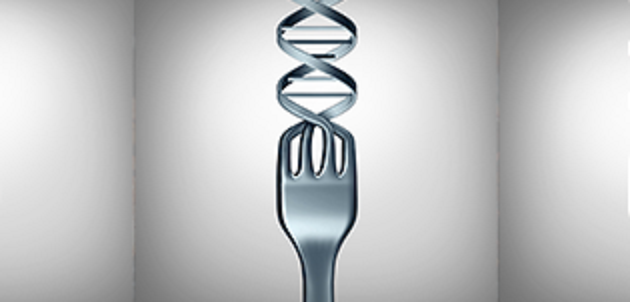By Danielle Gaffen, MS, RDN
Since ancient times, people have been interested in what components of a diet are good for us. Which foods will give us maximum benefits? Which may prevent disease? Which will help us lose weight? But we all differ from each other genetically, which means that we will each respond differently when it comes to nutrition.
What is Nutrigenomics? The term encompasses the interaction of nutrition with one’s genes. The rapidly growing research in this area is producing nutrition advice based on an individual’s genetic profile. This exciting topic is changing the field of nutrition as we know it.
Since the cost of DNA analysis is no longer prohibitive, it is becoming very common for people to buy kits (like from 23andMe or ancestry.com) to analyze their genetic code. Two to three years from now, the cost will drop further, and people will be able to get their entire genome sequenced affordably.
Nutrigenomics is ready to be presented and applied to the public. There are hundreds of genetic variants for which registered dietitian nutritionists can make nutrition recommendations at this time. However, this is only the start. With greater technological advances and research completed in the future, thousands or even tens of thousands of genetic variants related to nutrition could be analyzed to give extremely precise nutrition recommendations to an individual.
Take choline, for example. Choline is an essential nutrient that is important for liver and muscle function in adults. It is also vital for brain development in a fetus. It was determined that most Americans do not achieve adequate intake of choline, so in 1998, a requirement for choline was set by the Institute of Medicine. In 2016, the FDA established the Daily Recommended Intake for choline, and now, choline values in packaged foods are appearing on food labels. However, a recently published human choline study discovered that the requirement for this nutrient varies widely by gender, age, and one’s specific DNA. Additionally, choline deficiency presents itself differently in different individuals, based on each individual’s DNA sequence. In one person, choline deficiency could present itself as fatty liver, whereas in another, muscle damage, temporary infertility, or something else entirely could happen. In the future, an individual who has his or her DNA sequenced could provide the genetic profile to a registered dietitian nutritionist, who will be able to advise on exactly how much choline the person needs.
So how will Nutrigenomics influence the food industry, you may ask? Healthy Dining, a San Diego-based company, already provides healthful strategies and solutions which enables restaurant goers to:
Receive accurate nutrition information from restaurants to meet a guest’s nutrition-related needs, expectations and demands for transparency; and
Improve the healthfulness and quality of ingredients of the food restaurants serve.
Healthy Dining works closely with 250+ restaurant chains spanning 50,000+ nationwide locations, from quick service to fine dining.
Healthy Dining has recently revolutionized the dining out landscape by offering the only personalized nutrition platform, MyMenu, that matches restaurant menu items to guests’ lifestyle/ health needs and preferences. MyMenu is a next-gen interactive platform and virtual dining out “concierge” delivering on-demand, personalized nutrition and allergen information.
California Pizza Kitchen, Rubio’s and Souplantation are among the brands that currently offer MyMenu, and a larger rollout is planned with concepts including Noodles World Kitchen, Luna Grill and Wood Ranch. Healthy Dining also plans to expand MyMenu beyond the traditional restaurant space through collaborations with enterprise partners that include universities, worksites and weight loss and wearables companies.
So how does this relate to nutrigenomics and precision nutrition? Healthy Dining’s interactive MyMenu platform has the future in sight. As each consumer becomes more aware of the nutrients his or her body specifically needs, that individual will be more inclined to choose foods on a restaurant’s menu that align with his or her genetic profile. Restaurants that promote healthful menu items that may support a consumer’s personal nutrient needs will be at the forefront of the transition of food and nutrition as we know it!
Danielle Gaffen is a Registered Dietitian Nutritionist. She recently attended the Nutrigenetics, Nutrigenomics, and Precision Nutrition Conference at the UNC Nutrition Research Institute in Kannapolis, North Carolina.

